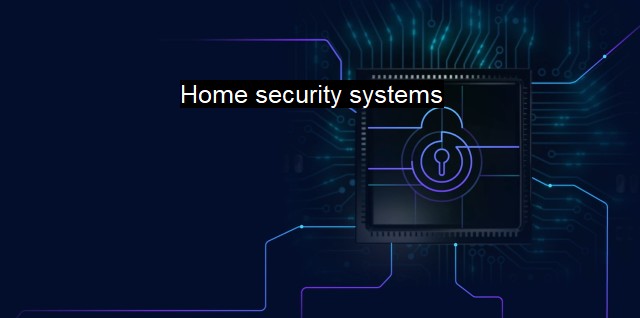What are Home security systems?
The Importance of Home Security Systems in the Digital Age: Protecting Your Home and Devices from Cyber Threats
Home Security Systems constitute a broad array of digital mechanisms designed to protect and secure your home from cyber threats. These encompass a holistic suite of gadgets, software technologies, network protocols, and security practices, ensuring the digital protection of all communication and information within a home network.Such security systems are becoming more critical every day for the myriad of internet-enabled devices we operate in our homes, known as the Internet Of Things (IoT). Devices ranging from smart fridges and heating systems, to sophisticated entertainment systems and home security hardware, are all dependent on secure network infrastructures. Potentially, any IoT device can be an access point for cybercriminals if not properly secured.
Primarily, a home (cyber)security system's role involves safeguarding data and systems from intrusion, unauthorized access, damage, or information theft. A secure network protects sensitive data from cyber networks that manage household utilities. This could be personal data kept in home computers, such as financial transactions or confidential correspondence, and information concerning utility usage patterns and customization from smart gadgets that, for genuine reasons, need to communicate across the home network.
Cybersecurity Home Systems heavily depend on complex software systems known as antivirus and antimalware programs. Antivirus is a security utility software designed to detect, prevent, and remove malicious software, also known as 'Malware'. Initially, antiviruses were made to detect and resolve infections caused by viruses, hence the name, further evolving with current technology changes to protect against broader threats such as ransomware, trojans, phishing attacks, malware, rootkits, etc. A competent antivirus solution in a home network mitigates security risks embedded in electronic mails, online actions, file downloads, and more.
A firewall, another element of Home security systems serves as a defense guard for your home network. Whether applied as software or as a hardware device, it acts as a gatekeeper between the home network and the internet. A firewall examines network traffic, allowing or disallowing based on preset security rules. This makes it challenging for outsiders or cyber threats to gain illicit access to your network.
Virtual Private Networks (VPNs) are also employed in reinforcing cybersecurity in homes. VPNs are useful tools for safeguarding data transmission within a network, providing an encrypted tunnel of secured communications between your device and the websites or services you're engaging with online. The process limits the exposure and vulnerability of your data to cyber-attacks.
Incorporating Artificial Intelligence (AI) and Machine Learning (ML) in Home Security Systems can lead to predictive capabilities, wherein the system identifies patterns or anomalies in device behaviors, thereby recognizing a possible cyber threat before it can inflict any significant damage.
Privacy tools and password managers are likewise critical aspects of home security systems. Strong passwords make devices difficult to breach, while privacy tools reinforce their cloaking from cyber predators.
Home Security Systems hold immense significance for cybersecurity and antivirus, positioning themselves as an essential layer of protection between cyber predators and one's data. With the increasing digitization and dependency on connected devices, Home Security Systems will continue to epitomize proactivity and resilience against growing cyber threats. As the combination of software and hardware solutions evolves and advances, so too does the preservation of our cyber home’s sanctity- ever silently, ever vigilantly.

Home security systems FAQs
What is a home security system?
A home security system is a series of devices, including cameras, sensors, and alarms, that work together to protect a home against burglaries, vandalism, and other security threats. The system can be monitored and controlled through a central panel or a smartphone app.What benefits do home security systems offer in terms of cybersecurity?
Home security systems offer several benefits in terms of cybersecurity, such as protecting against hacking, cyberattacks, and unauthorized access to home devices. Modern home security systems use encryption and other advanced technologies to secure the home network and prevent cyber threats.What are the costs associated with installing a home security system?
The cost of installing a home security system varies depending on the type of system and the features included. Basic systems can cost as little as a few hundred dollars, while more complex systems with advanced features can cost several thousand dollars. It's important to research different systems and compare prices before making a decision.Are home security systems difficult to install?
Most home security systems are designed to be easy to install, and many can be set up without professional installation. DIY installation is usually straightforward, and most systems come with instructions and online resources to guide homeowners through the process. However, if you are not comfortable with DIY installation, you can hire a professional installer for an additional fee.| | A | | | B | | | C | | | D | | | E | | | F | | | G | | | H | | | I | | | J | | | K | | | L | | | M | |
| | N | | | O | | | P | | | Q | | | R | | | S | | | T | | | U | | | V | | | W | | | X | | | Y | | | Z | |
| | 1 | | | 2 | | | 3 | | | 4 | | | 7 | | | 8 | | |||||||